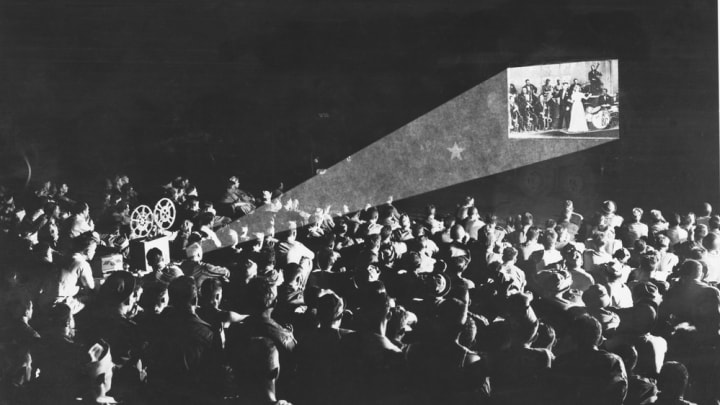Shaping Society Through Cinema

Andy Warhol once said that "it's the movies that have been really running America," and he was not wholly wrong. In fact, films have a significant impact on society as a whole and the statement is not limited to the United States alone. Because it is a form of mass media, movies greatly affect audiences; hence they were used by leaders as a propaganda tool in the past. Through the prevalent art form, dictators like Hitler and Stalin tried to influence people with their own beliefs. Before television and the dawn of the internet age, movies have been the dominant medium to share and receive information about humanity and the world. More than a hundred years later, its popularity has not diminished. Nonetheless, the impact of movies on today's modern society varies, some negative and some positive.
Helps Develop a Deeper Understanding of History and Culture
Many movies have been based on real-life events, such as the Oscar-winning Argo and Dances with Wolves. Aside from the primary goal of entertaining audiences, these projects aimed to show viewers what transpired during important events in history. Of course, filmmakers add fictional elements to stories to make them more interesting to watch, such as in the case of Titanic. There were no real-life Rose and Jack, although they were the film's central focus. Nevertheless, James Cameron's masterpiece is the closest we could see one of the most opulent ships in the world in all its glory; since it's only a wreck now lying at the bottom of the Atlantic Ocean. Additionally, audiences got a peek at how life was during the early 1900s. So, there was a lesson about early Western culture, especially for viewers who live in other parts of the world. On a related note, films can be used to promote cultural awareness, curiosity, and respect for diversity by educating viewers about other cultures. An excellent example of this is Bend it Like Beckham, wherein a South Asian teenager raised in Great Britain faces cultural identity development issues.
It Has the Power to Inspire and Motivate
No matter how some people tag movies as detrimental to mental health, there is no denying how they inspire and encourage. It's common to have those days when you don't feel motivated to accomplish anything—you don't even feel like getting out of bed. While some choose to read self-help books to improve their moods, others’ preferred solution is to watch an inspirational movie. The types that uplift and make people hold on to the promise of a great future. Films like The Pursuit of Happiness show us how hard work pays off. It's a must-watch for entrepreneurs who feel trapped in a rut and like giving up on their business. For some, a quick fix is as simple as watching feel-good movies, the ones that are full of warmth and goodness, giving smiles to faces as it ends. Classics like Some Like It Hot, Four Weddings And A Funeral, and The Princess Bride would surely do the trick.
Life Imitating Art
One of the significant ways movies affect society is through the products they showcase. For example, seeing characters drink Coca-Cola several times in a film would likely make audiences purchase the drink after watching. It's not mind-conditioning but a simple marketing technique called 'product placement.' It involves characters mentioning specific brands or products throughout the script and incorporating them into the production to with the goal of promotion. James Bond movies are the best examples of this, advertising a range of items, from computers to cars.
Nevertheless, this effect of movies on society is not always good because there are numerous different ways in which people try to reproduce things they've seen in movies. James Holmes, a superhero fan, was said to have been inspired to do a violent act after seeing The Dark Knight Rises. No one knows what exactly triggered him, but the theory was that Holmes did not like how the movie defiled the Batman character. Then, there was 1971's A Clockwork Orange which increased the crime rate in America shortly after it was shown in cinemas.
Dilemma Faced by Parents
Although movies are a great source of knowledge and valuable lessons, not everything should be absorbed, especially by young minds. This is an ongoing dilemma for parents because all types of films are readily available for anyone with a smartphone, tablet, or laptop. In today's cinema, many things that have become normalized don't belong there, like the negative portrayal of lovemaking and drug use. Additionally, if often exposed to media, such as movies, children's value systems and beliefs are shaped by it. Their young minds still could not grasp what fantasy is and what is not, and without parents telling them the distinction, they could decide for themselves. This is why experts believe parents and other adults must talk to children to help them evaluate the messages they get from films.
There is no denying that movies are the most influential art medium today. We do not see people smiling like Mona Lisa or posing like David in photos because they love those masterpieces. Films, on the other hand, we see their effects in our everyday lives, such as mimicking famous movie lines, and going out dressed as our favorite screen character. Yes, they have a two-fold effect, but the positive clearly outweighs the negative. As audiences, we are responsible for practicing critical thinking and not letting films completely change who we are.